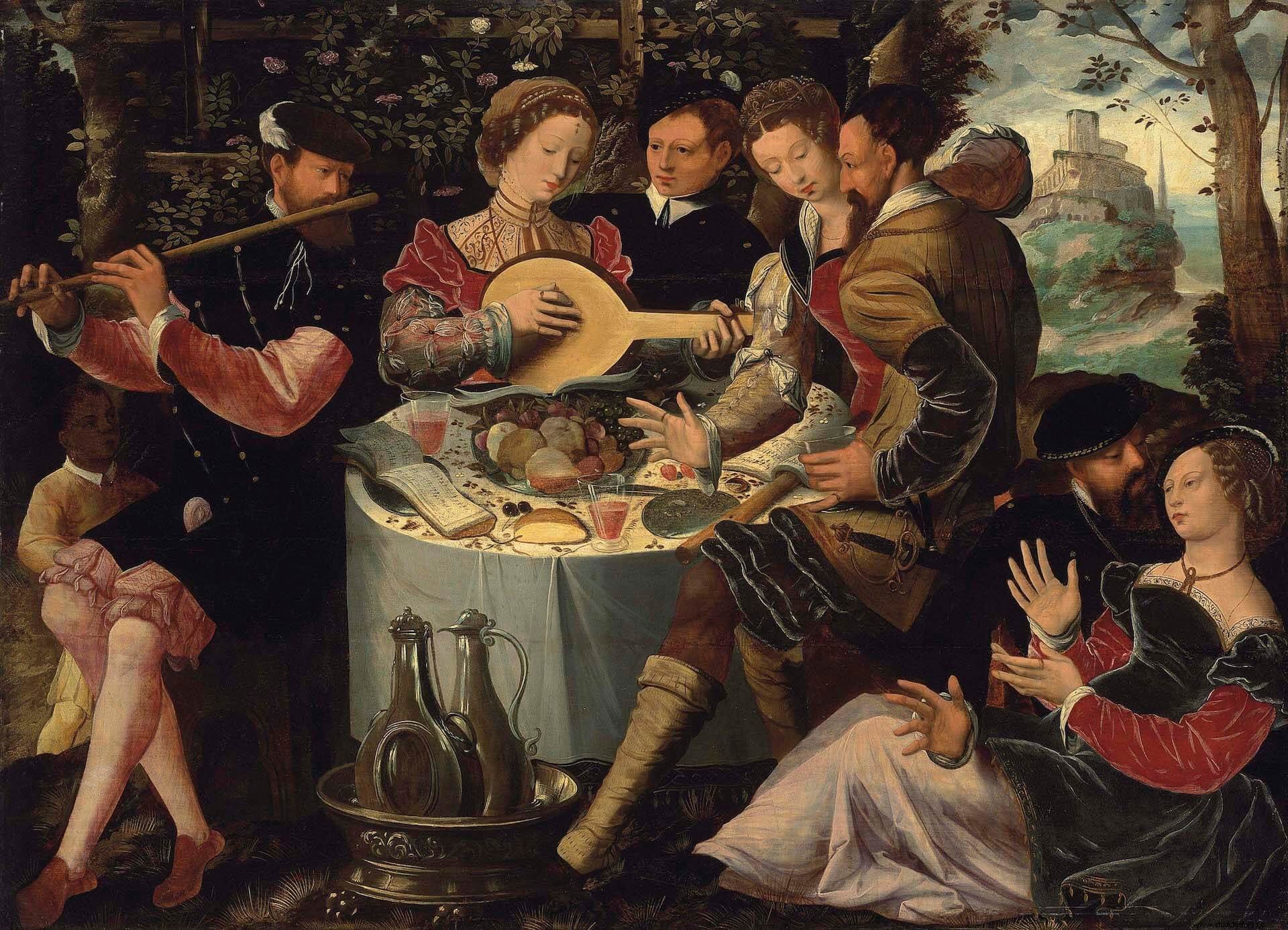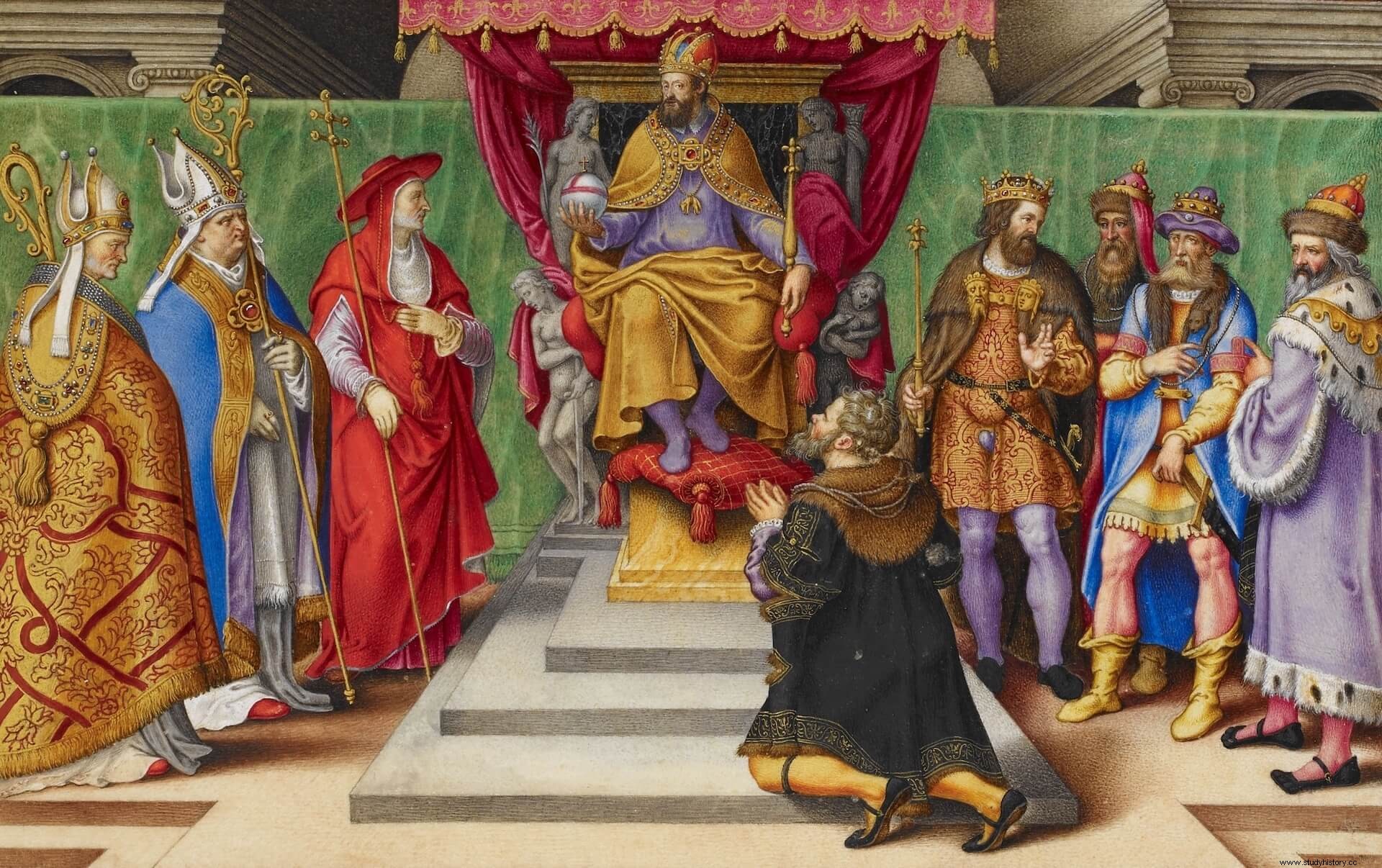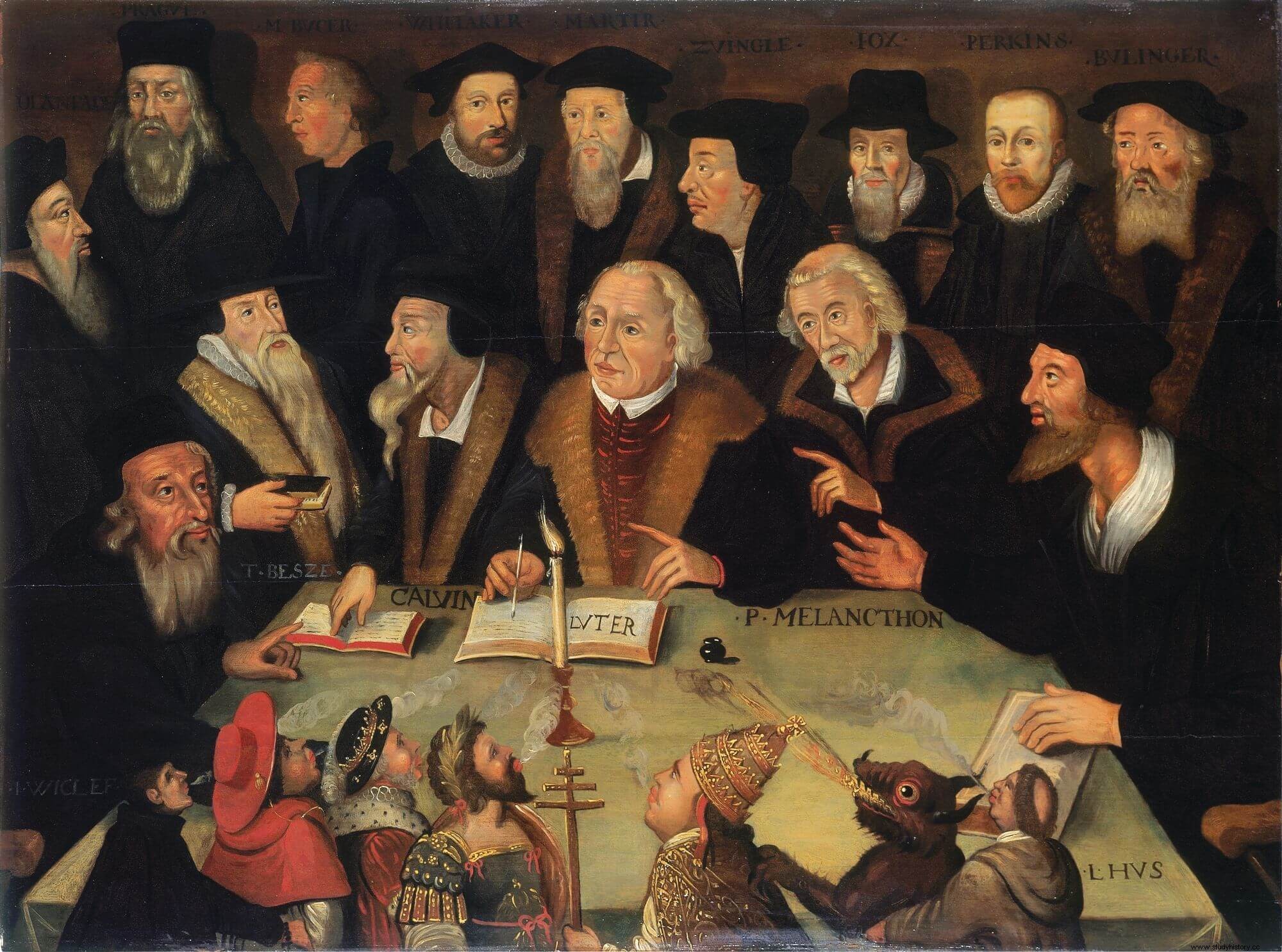
The sources present a very different reality:far from the A consummate drinker and womanizer who has gone down in history, the Caesar was characterized throughout his life by his sobriety, moderation and extreme chastity beyond what was strictly necessary to ensure the future of his lineage.
Caesar's moderate behavior was undoubtedly instilled in him by his tutor Hadrian of Utrecht, who did not hesitate to rant against wine and carnal pleasures from his dais when, in his maturity, he was lecturing in theology at the University of Leuven. Upon his arrival in Spain, Carlos acted with a monastic frugality that disconcerted his new subjects. We know from the chronicler Luis Machuca, councilor of the city of Valladolid, that during the future emperor's stay in that city between 1517 and 1518, he refused to taste a drop of wine:"He was offered white wines from Rivadavia, Yepes, Madrigal, Simancas, Medina del Campo, Villafranca, Monviedro, Orense, Martos and Ciudad Real, which not being marinated are like medicine, and likewise red wines from the loins of Madrid, Arenas, Alcarria, Escalona, Cigales, Toro, Illana, Hubeda and Valdepeñas, but he did not want to drink any drop, arguing that it was a drink from the devil.”[2]
The Castilian chronicler goes so far as to affirm that the lack of interest of the monarch in Spanish wine was one of the main causes of his unpopularity among the middle and lower classes , who shortly after would rise up against him in the War of the Communities:“and in all those present, as well as wealthy men and bourgeois – writes Machuca – it caused great pity to see that such a great lord and prince of so many kingdoms had little regard for wines. of the land, which was of no little reason in the sedition of the people and the alterations in this city of Valladolid”. This is not a tricky accusation, since it was common in the subsequent alterations that the common people imprecise the king with nicknames such as "turquoise horn" - alluding to the abstinence practiced by Muslims and prognathism (the famous protruding jaw) of the Habsburgs. –.[3]

It does not appear that the emperor changed habits with the Over the years, the testimony of Bartholomäus Sastrow, emissary from the imperial city of Stralsund to the Caesar during the War of the Schmalkaldic League, unequivocally confirms the frugality and abstinence of the emperor :“Ordinarily there were four appetizers with six plates:after putting them on the table they uncovered them, if he didn't like them he would nod his head, and bow if they pleased him, then he would bring them closer; huge cakes, game pieces and the most succulent fercula were returned ".[4] The emperor, Sastrow continues, would instead take "a saucer of porridge so tasteless and gray that a Swabian cartwright would have refused it if the landlord of a roadside inn had put it on his table," and drink a meager glass of water:"they drank from the sideboard the medicinal doctors two silver flasks and filled a crystal glass with water taken from the well that morning, which the emperor drank to the last drop with such naturalness and cleanliness that it was a pleasure to see him.”
Equally frugal was the emperor's retreat in the Yuste monastery. The image of the Caesar surrounded by servants –including his own brewmaster– is actually a falsehood propagated by the Protestant theologian Leonhard Piscator, from Lübeck, in his imprecise 1685 work Historia persecutionum Caroli V Imperatoris contra fideles religionis verae reformatae (“History of the persecutions of Emperor Charles V against the faithful of the true reformed religion”), which, among other fables, accuses the emperor of practicing intercourse with frogs .[5] In reality, as the Caesar's confessor, Fray Pedro de Lamo, wrote to Felipe II:“His Imperial Majesty insists on going barefoot, and drinks only rainwater, and eats stale bread, and the magnanimous prince has so few left. healthy teeth that it is a matter of great piety to see how it gnaws the bark of the crust as a vole gnaws the ripe harvest, which is a great example for all, and we try to imitate such a pious prince”.[6]
Carnal pleasures, a pillar of the black legend of Carlos V
The Caesar's womanizing attitude is another historical hoax spread by his Protestant rivals, who attribute dozens of bastard children to him with all kinds of women, among which there is no lack, to name a pamphlet attributed to the Protestant theologian Timotheus Candidus, "a black bribe with a body in the shape of a jar", which he would have fallen in love with during his expedition to Tunisia in 1535. In reality, the emperor, judging by his observations, was not very fond of to feminine beauty. Of the Spanish he said that “it is not that they are a big deal , since they wear a finger's thickness of make-up", while he was repelled by the German women's clothing, in particular their "furry skirts" and their ruffs "as thick as Parmesan cheese".[7]

Sastrow makes it clear in his thorough chronicle that yes, in mid-1547, “in the city [Augsburg] there was murmuring and the devil bursting with joy” at the concupiscence of the imperial courtiers, “the emperor, far from giving banquets, did not accompany him” and “he ate alone without speaking a word ”. The German chronicler recounts a particularly eloquent event that he witnessed:on the way to Bamberg, in order not to fall prey to bandits, deserters or angry peasants, he joined the retinue of Duke Frederick of Liegnitz, who was marching with the emperor's army. "Two harlots in magnificent silk suits accompanied us," he writes; at the slightest whim a woman was taken by the hand and led to a corner”. The party, however, ended with the sudden appearance of the Caesar, who admonished the Duke with a sarcastic laugh and dismissed the prostitutes. “The duke – Sastrow continues – knelt on the ground, asked for forgiveness and promised to spill every last drop of his blood for S. M. The Emperor tapped his cane on his back and gave him full absolution. –Enough, Federico, he told him, you're forgiven, but don't go back to your tricks”.[8]
Carlos's disinterest in eroticism attests to Titian's correspondence , who, in a letter to his friend and confidante, the Florentine sculptor Giorgio Chiellini, laments the emperor's refusal to commission representations of Venus:“S. M. I., dear friend, prefers that I paint Tantalus, Ixion, Sisyphus and Ticio rather than Venus, and when I asked him why, he smiled and told me that it is because of the rosy flesh of Venus that the weapons of Mars grow cobwebs . And, in truth, the emperor prefers chess and hunting to the courtship of ladies, in which he stoops with boredom, and I have heard him say that going after women is the vice of Frenchmen, heretics and effeminate.”[9]
Titian synthesizes in these words the mentality of Charles V, a chaste and abstemious man, far from the drunken fornicator of the Black Legend of Protestant pamphlets , who consecrated his life not only to the fight against the enemies of the Catholic religion, but also against bad customs; a figure whose most unknown facets are finally coming to light.
Notes
[1] Dunphy, P. (1999):Prostitution and politics. From Ancient Rome to Silvio Berlusconi . New York:Penguin Books, p. 212.
[2] Machuca, L. (1537):Cronicha de la Insigne Civdad de Valladolid. Contains the events of the years MDVII to MDXXXVI . Valladolid:Printing of Jerónimo Aguilar, p. 638.
[3] Pérez, J. (1998):The revolution of the communities of Castile (1520-1521) . Madrid:XXI century, p. 235.
[4] Sastrow:B. (1905):Bartholomew Sastrow:being the memoirs of a German burgomaster . London:A. Constable, p. 201-202.
[5] Schneider, U. (2012):“'And thus the emperor fornicated with frogs':Leonhard Piscator and the anti-imperial speech in Germany during the late 17th century ”, in Tucker, C. (ed.):Religious propaganda in Early Modern Europe:from Martin Luther's balls to Luis de Góngora's nose . Leiden:BRILL, p. 76.
[6] Calderón, J. (2021):“Stale bread and rotten porridge. New perspectives on the retirement of Carlos V in Yuste”, Notebooks of Modern History , Vol. 46, No. 2, p. 187.
[7] Estevez, E. (2006):“Charles V:a sexual approach”, Journal of the History of Sexuality , Vol. 6. No. 5, p. 98-102.
[8] Sastrow, Op. cit. , p. 179.
[9] Alberti. L. B. (2013):“Tiziano and calcio fiorentino”, I Tatti Studies in the Italian Renaissance , Vol. 13, No. 4, p. 86.
Innocent? We're afraid so
The text published yesterday, titled Carlos V, neither drunk nor whorehouse , is an innocent. The vast majority of the sources cited are the product of the author's invention, and those that are not, like some of Bartholomäus Satrow's quotes, are out of context or have been misrepresented. In reality, the emperor was a great fan of beer, to the extent that in his retirement in Yuste –where, far from leading a frugal life, as the article states, he lived surrounded by comforts–, he had his own master brewer, the Flemish Enrique van der Trehen, whose activity and expenses are well accredited in the file 1145 of the Major Accounting Office, kept in the General Archive of Simancas. We also know that the emperor appreciated the wines from the Rhine, Cádiz, Cariñena and La Vera –also present at his banquets in Yuste–. Nor is the emperor's chastity certain. Proof of this are the children he had out of wedlock with different women:Margarita de Parma, whose mother was Johanna Maria van der Gheynst, a servant in the house of Carlos de Lalaing, Lord of Montigny; Juana de Austria, born from the relationship he had with Catalina de Rebolledo, lady-in-waiting of his mother, Queen Juana; Tadea of Austria, fruit of the Caesar's affair with the Italian lady Orsolina della Penna, and Juan of Austria, whose mother was Barbara Blomberg, a bourgeois from Regensburg. There are also allusions to other extramarital affairs of the Caesar, such as with the widow of his grandfather Fernando, Catalina de Foix, to whom the buffoon Francesillo de Zúñiga alludes in his Burlesque Chronicle of Emperor Carlos V . Such love affairs were not far from secret, as Alonso de Santa Cruz, in his Chronicle of Emperor Carlos V –Written between 1550 and 1552– it says:"In the vice of meat it was in his youth, because he had a bastard daughter in Flanders and another in Castile".
